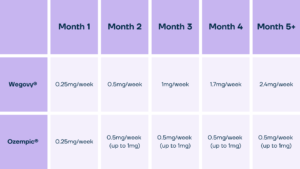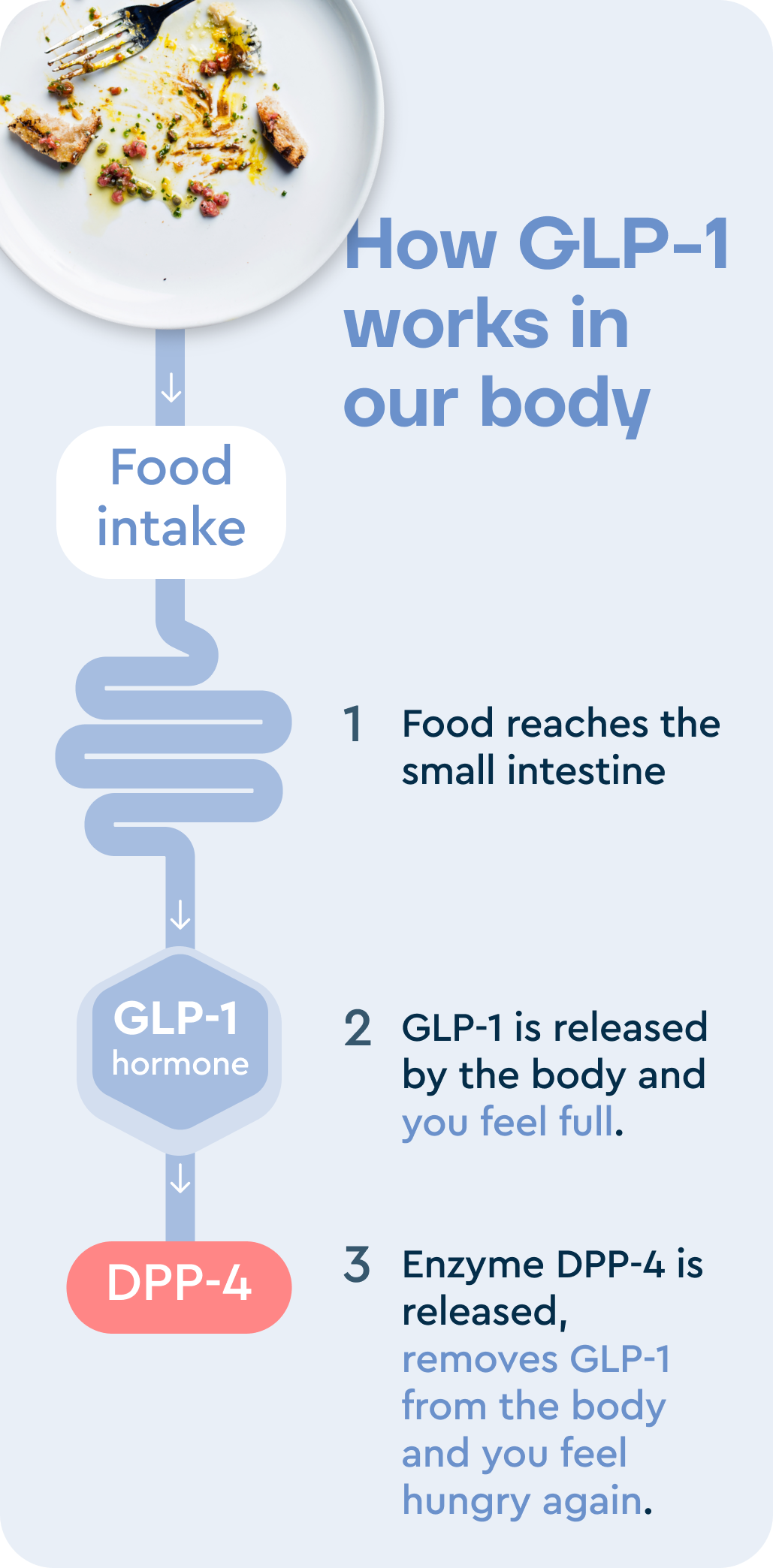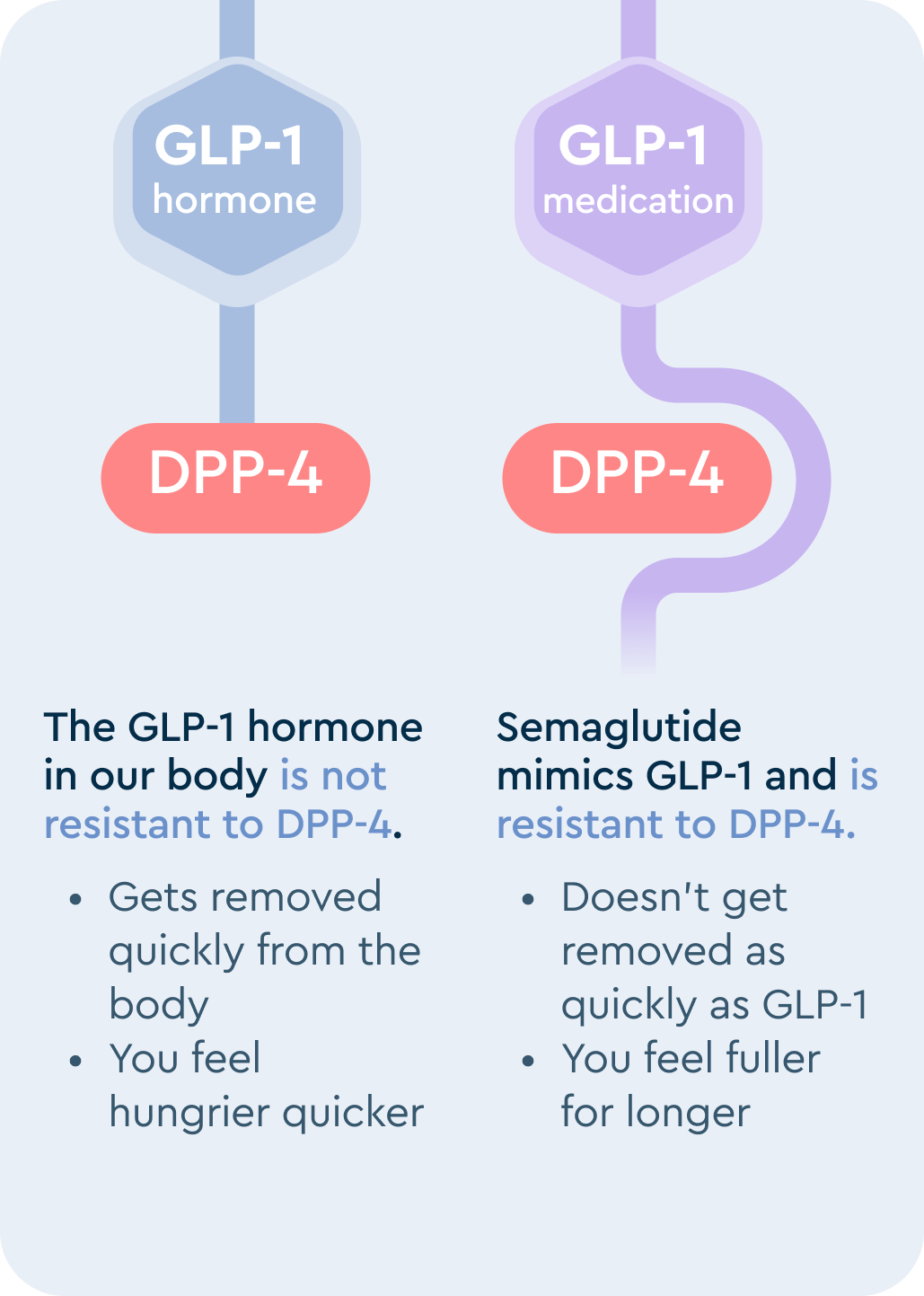Jump to: How do Wegovy and Ozempic work? | Do you lose more weight on Wegovy, Ozempic, or Saxenda? | Do you lose more weight on Wegovy or Ozempic? | Take home message
Wegovy and Ozempic are the same drugs (semaglutide) under different brand names from the pharmaceutical company Novo Nordisk. Both medications require a weekly injection.
Ozempic is approved for individuals living with type 2 diabetes to support blood glucose control, while Wegovy is approved for individuals living with obesity to help them eat fewer calories and lose weight.
Second Nature has a Wegovy weight-loss programme and a Mounjaro weight-loss programme. Both programmes support our members develop healthy habits while the medication supports weight loss.
Wegovy is generally more effective than Ozempic for weight loss and improving blood sugar levels due to the higher doses available, with similar rates of adverse events and side effects.
Semaglutide is a GLP-1 receptor agonist that helps reduce hunger and appetite, allowing you to eat fewer calories, lose weight, and manage your blood sugar levels.
Wegovy and Ozempic are taken once a week via a self-administered injection.
The only difference between the two drugs is the recommended dosage and what they’ve been approved for. Wegovy is available in higher doses than Ozempic.
Wegovy and Ozempic dosing schedules:

Ozempic is available to purchase in the UK and U.S. and via prescription from your GP in the UK if you’re living with type 2 diabetes.
Wegovy is available via Second Nature alongside our Wegovy weight-loss programme if you’re eligible.
Medication-assisted weight loss with a future focus
Start with Wegovy or Mounjaro, transition to habit-based health with our support


1) How do Wegovy and Ozempic work?
When we eat food, our stomach releases a hormone that helps the body regulate hunger and blood sugar levels. This hormone is called GLP-1 (glucagon-like peptide-1).
Wegovy and Ozempic are in a class of medications known as GLP-1 receptor agonists (GLP-1s). They mimic the actions of the hormone GLP-1.
Wegovy and Ozempic help your pancreas release more insulin to lower blood sugar levels, delay emptying food from the stomach (also called gastric emptying), and reduce appetite by interacting with the brain’s appetite reward centre, the hypothalamus.
The effect of the hormone GLP-1 is short-lived as it’s removed from our system by an enzyme called DPP4.

Wegovy and Ozempic have been designed to mimic the effects of the hormone GLP-1 while being resistant to the enzyme DPP4, which means it can have a longer-lasting impact on the body.

How long does it take for Wegovy and Ozempic to work?
You might notice a drop in appetite (hunger) immediately, but in the first 8 weeks, this might only last for the first 4-5 days post-injection.
Semaglutide is a long-acting medication that’s started at a lower dose to reduce the number and severity of side effects as we build up to a higher maintenance dose.
Semaglutide can take 4-5 weeks to reach a level in the body we call a steady state. A steady state is when the drug’s levels in the body remain consistent, rather than spiking and falling.
This means you might notice the drug’s effects wearing off after 4-5 days post-injection in the first 4-8 weeks. But don’t worry, this is a normal part of the process as it builds up to its steady state.
Key points:
- GLP-1 receptor agonists (GLP-1s) are a class of medications that mimic the actions of the hormone GLP-1, which helps regulate hunger and blood sugar levels
- GLP-1s help the pancreas release more insulin, delay stomach emptying, and reduce appetite
- Semaglutide is a long-acting medication and can take 4-5 weeks to reach a steady state in the body where its level remains consistent
2) Do you lose more weight on Wegovy, Ozempic, or Saxenda?
Wegovy and Ozempic are more effective at supporting weight loss than other weight loss jabs, like Saxenda.
A randomised controlled trial was conducted in 2022 investigating the impact of semaglutide and liraglutide on weight loss in individuals living with obesity.
The results showed that the participants in the semaglutide group lost 15.8% of their body weight compared to 6.4% in the liraglutide group.

Semaglutide was also shown to be more tolerated than liraglutide. 13.5% of participants in the semaglutide group discontinued their treatment due to side effects, compared to 27.6% with liraglutide.
Over 80% of participants in both groups reported common side effects and GI-related issues such as constipation, cramping, bloating, and diarrhoea.
Due to the positive results from these studies, Semaglutide was made available in 2022 in the UK after the U.S. approved the drug in 2021.
Key points:
- A meta-analysis compared the impact of semaglutide (Ozempic) and liraglutide (Saxenda) on lowering blood sugar levels (measured by HbA1c) and suggested that semaglutide was more effective than liraglutide
- A randomised controlled trial conducted in 2022 investigated the impact of semaglutide and liraglutide on weight loss in individuals living with obesity
- The results showed that semaglutide was more effective at weight loss (15.8% body weight loss) than liraglutide (6.4% body weight loss)
- Semaglutide was also better tolerated than liraglutide, with fewer participants discontinuing treatment due to side effects, but GI-related issues were common in both groups
3) Do you lose more weight on Wegovy or Ozempic?
Research has shown that you’ll lose more weight on Wegovy than on Ozempic. You’ll also see greater reductions in blood sugar levels.
Initial research on semaglutide focused on Ozempic and doses between 0.5mg and 1mg.
However, the studies found that 20-30% of individuals on the medication didn’t reach the treatment targets for reducing their blood sugar levels.
A randomised controlled trial with 961 participants compared the impact of a once-weekly dose of 1mg or 2mg of semaglutide on blood glucose levels and weight loss for people living with type 2 diabetes.
You might expect that a doubling of the dose would lead to a doubling of the effect.
However, the human body is a bit more complex than that. Medications (and hormones in the body) often have a ‘ceiling effect’ where the relationship between the exposure and the effect is no longer linear.
The results showed that 1mg of semaglutide reduced HbA1c (average blood glucose) by 1.9% compared to 2.2% in the 2mg group.
A similar trend was shown with weight loss. 1mg of semaglutide led to an average weight loss of 6 kg compared to 6.9 kg in the 2mg group. Interestingly, both groups reported similar levels of adverse events and side effects.
So, the higher dose of semaglutide that you’ll receive with Wegovy will likely lead to slightly more significant reductions in weight loss and blood sugar levels without experiencing more adverse events or side effects.
However, you must monitor your medication responses and determine your tolerance level. You might tolerate a higher dose, but you might not.
The research on these medications has shown that the most severe side effects are reported when the dose of the medication is increased while your body adjusts.
You might determine that any side effects are worthwhile to help you improve your health conditions and lose weight.
But you must contact your healthcare team and discuss any side effects to ensure this is monitored and the dose adjusted to suit your needs.
Key points:
- Most research with semaglutide is with the doses of 0.5mg and 1mg that you have with Ozempic
- Only one trial has compared the impact of 1mg to 2mg of semaglutide and found it did lead to more significant reductions in weight and blood sugar levels
- However, the differences weren’t as significant as you might expect and the dose that’s best for you will depend on your tolerance level and weight loss goals
- You must report any side effects to your healthcare team and adjust your dose accordingly
Take home message
Weight-loss injections are designed as additional tools for weight management interventions and shouldn’t be considered lifelong medications.
Instead, they should be used to help you kickstart your weight loss and healthy journey while you commit to living a healthier lifestyle.
Consider the use of antidepressants for people living with depression. They’re not designed to cure the condition. Instead, they’re designed to allow room for therapy to treat the condition’s underlying cause.
Mounjaro, and other weight loss injections, like Ozempic and Wegovy, are similar. They can allow you to make lifestyle changes to support long-term weight loss maintenance.
Mounjaro can help silence food-related thoughts and also give you a boost of confidence with more immediate weight-loss results.
This helps to buy you the time and headspace to understand why your body may have struggled to lose weight previously, and to build new long-term healthy habits.
The core focus of our medication programmes is to calm down the feeling of food noise, lower your cravings, and allow you to build healthier habits to keep the weight off for good.
The ultimate goal is to make losing weight feel second nature.
Second Nature’s medication programme
Second Nature currently provides Mounjaro as part of our Mounjaro weight-loss programme.
Why should you choose Second Nature over other medication providers if you’ve decided to try Mounjaro (assuming you’re eligible)?
For peace of mind.
Second Nature has worked with the NHS for over 6 years providing weight-loss programmes across the UK.
While our Mounjaro weight-loss programme is private and not currently used by the NHS, we’ve built the programmes focusing on scientific evidence, patient safety, and data security.
We hope that our 6+ years of working with the NHS and building a track record of effective weight-loss results will give you peace of mind to give us a try.


